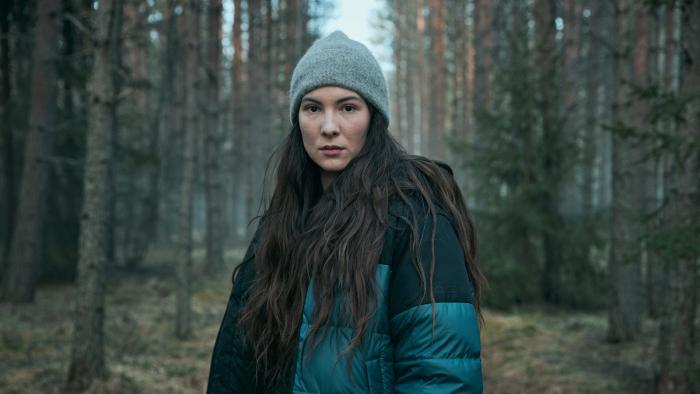By Dustin Rowles | TV | April 25, 2025

I am a sucker for dark Netflix mysteries, particularly the ones that gain traction on the platform, like The Åre Murders or every Harlan Coben series ever. And by sucker, I mean: They usually suck, and I get drawn in anyway.
The Glass Dome (Glaskupan) is the latest Scandi Noir hit for Netflix, and this one actually boasts a gripping start and a decent payoff. It’s everything in between that’s a slog.
Lejla (Léonie Vincent) returns to her hometown in Sweden from the United States, where conveniently she’s become an expert in profiling child predators. She was inspired to enter the field after being abducted as a young child and held in a glass case by a still-unknown man. Her mother died by suicide shortly after Lejla escaped, and she was then taken in by Valter (Johan Hedenberg), the town sheriff, a gentle and melancholic man who raised her as his own. In the present, Valter has retired, and his brother Tomas (Johan Rheborg) has taken over the job.
Lejla returns for the funeral of Valter’s wife, with whom she had a strained relationship. While back home, she reconnects with her childhood best friend Louise, whose marriage to Said (Farzad Farzaneh) is on the rocks. Lejla plans to fly back to the States after the funeral, but she stops by Louise’s house and finds her dead in the bathtub, in what appears to be a suicide. Her daughter, Alicia, is missing.
Lejla decides to stick around to help Tomas investigate Alicia’s disappearance, given her background. It also turns out Tomas had been having an affair with Louise, which he begs Lejla and Valter to keep secret, lest he get fired for not mentioning he was sleeping with the murder victim.
That’s the setup, and the first two episodes are solid, as Lejla starts to see possible links between her own childhood abduction and Alicia’s disappearance. Spoilers: Unfortunately, the next three episodes are mostly red herrings, drawn-out, obvious misdirections that feel more like filler than suspense.
Episode three revolves around a mine operated by Said that poisons the groundwater, sabotaged, we learn, by a local hoping to drive Said out of town. There’s some brief suspicion that the saboteur might also be involved in Louise’s death and Alicia’s kidnapping (it becomes clear early on that Louise didn’t take her own life), but the show basically drops that investigation by the next episode.
Episode four focuses on a copycat creep in the search party who cozies up to Lejla, lures her to his place, spikes her drink, and tries to abduct her (he’d recently been released from a psychiatric hospital). She forces herself to vomit and escapes. The guy, Martin, had abducted another girl because of his own obsession with Lejla, but he’s clearly not the one behind Alicia’s or Lejla’s abductions. He’s too young to have been Lejla’s kidnapper, for starters. He’s eventually found brutally murdered, presumably by the real perpetrator.
Then episode five shifts suspicion to Tomas. There’s plenty to raise eyebrows: the affair with Louise, the fact that he would’ve known Lejla as a child, and his odd presence at the same hotel where Lejla’s mother died by suicide. But there are so many clues pointing to him that he practically disqualifies himself from being the killer. It’s too obvious.
By this point, Lejla has started connecting the dots: the abductions of herself and Alicia, plus several other missing girls from two decades prior, all fit the same psychological profile.
And then, in the finale — after one last fake-out suggesting Tomas is the culprit — the truth drops: it was Valter all along. The sweet, melancholic old man who raised Lejla had actually abducted her as a child, held her in a glass cage, and then adopted her after she escaped … only to abduct her again decades later and lock her in the same glass cage alongside Alicia.
Does it make sense? Not especially. Most viewers probably suspected Valter from the beginning, but the show spends three or four hours piling on distractions to steer attention elsewhere. But he was always the obvious choice: the cop who conducted the original investigation, who mysteriously had no answers, and who conveniently swooped in to “save” Lejla. No one ever suspects the cop! (Except in American thrillers, where the cop is always the second-most-suspicious guy after the boyfriend.)
It’s definitely not the worst of Netflix’s grim, joyless thrillers. It’s better than most of the Harlan Coben batch. But it’s still ultimately disposable, and barely worth the hype that comes with landing in the Netflix Top 10.